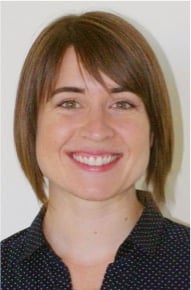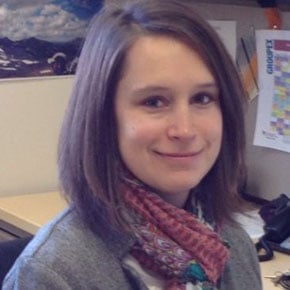The Colorado Clinical and Translational Sciences Institute (CCTSI) TL1 program is making CU Anschutz a top-choice for students like Michelle Nelsen, who is pursuing her PhD in immunology. Nelsen heard about the program during a recruitment weekend event and was interested in additional opportunities to observe clinical medicine. The TL1 program opened doors for Nelsen to collaborate with physicians and researchers in her field.
 Michelle Nelsen received valuable support for her research through the TL1 program.
Michelle Nelsen received valuable support for her research through the TL1 program.
“The TL1 program gave me the support of a program and made me comfortable talking to and asking to shadow physicians because I had the program to stand on,” Nelsen said. “This was important to me since I thought that clinical exposure would make me a better biomedical scientist.”
What is the TL1 program?
A program within CCTSI, the TL1 program launches careers in research by providing support for PhD students pursuing a Certificate in Clinical Translational Science. Students in the program are able to take advantage of research funding, as well as mentoring by faculty experienced in basic and clinical science.
[perfectpullquote align="right" cite="" link="" color="" class="" size=""]The CCTSI is now accepting applications for the TL1 program. Deadline is May 2.[/perfectpullquote]
“For students in a PhD granting basic science program, partnering with an MD or other clinician gives a much better understanding of what impact your work can have on people suffering from life-threatening illnesses or other chronic issues,” said Emily Warren, programs manager for education, training and career development within the CCTSI.
Additionally, students in the TL1 program are able to apply for one year of funding at the NIH level to support their research, alongside financial support for tuition and fees, research supplies and travel to the national meeting of the Association for Clinical and Translational Science.
“This program provides not only a stipend, but also an opportunity to interact with other students from other programs,” Warren said. “This is important as translational science enables students in the program to become someone who can bridge the gap between the lab and clinical practice. Team science collaborations between disciplines are becoming more and more prominent.”
Supporting research
Receiving a grant from the TL1 program has been helpful in Nelsen’s research in transplantation immunology. Nelsen is currently examining alternatives to immune suppression drugs that might exhibit fewer side effects and toxicity levels in transplantation patients. By using her clinical observations of patients to guide her laboratory experiments, Nelsen has helped identify key clinically-relevant situations when the new anti-rejection agents might fail in transplant recipients.
The grant has allowed her to free up resources that would normally cover her stipend and also purchase additional equipment that has enhanced the quality of her study. In addition, by using funds provided through the program to attend the national CTSA TL1 meeting, Nelsen has already begun building a professional network of peers.
“The program is an opportunity for us as basic scientists to learn about translational science, clinical medicine, and research opportunities,” Nelsen said. “It also gives us a better understanding of why we are answering basic science questions and how our work applies to patients.”
The experience in the program has been so profound that Nelsen now plans to attend medical school after graduating with her PhD so she will be able to work across disciplines in clinical and research environments.
“Because of my TL1 experience and being able to observe physicians and surgeons, I have decided to pursue a career as a physician scientist,” Nelsen said. “I want to be able to care for patients and also work to address current shortcomings in treatment.”
Translational science is team science
Allison Shapiro, who received her PhD in epidemiology from the Colorado School of Public Health in December 2015, participated in the TL1 program and received support necessary to design and implement the Baby Biology of Intrauterine Metabolic Programming (BabyBUMP) project, a study using mesenchymal stem cells (MSCs) as a model for human adipogenesis (forming fat cells) in response to nutritional influences.
 TL1 program participant Allison Shapiro describes translational science as "the core of her research."
TL1 program participant Allison Shapiro describes translational science as "the core of her research."
This ambitious study, which utilized patients from a cohort of 1,400 women from the Healthy Start Study at CU Anschutz, saw Shapiro and CCTSI research nurses collecting umbilical cord samples from more than 160 patients at delivery. She would then isolate, culture and examine the stem cells.
Reflecting on the project, Shapiro credits a team of faculty and clinical mentors across disciplines who collaborated to share knowledge, resources and experience necessary to complete her dissertation. She recognizes her project as a “true collaboration between scientific fields.”
“Translational science is the core of my research, and it’s constantly what I look to when I start thinking about new study ideas,” Shapiro said. “We don’t live in a world anymore where researchers can work alone, in silos. We live in a team science world, and translational science is the road to team science.”
Since graduating, Shapiro has leveraged the knowledge she has gained in designing studies, disseminating large data sets and gaining perspectives from other fields during her post-doctoral work. For the next two years Shapiro will be working alongside physicians and researchers at Children’s Hospital Colorado examining fetal and infant brain development.
It is Shapiro’s next step in a career that will focus on research.
“I live and breathe academia,” Shapiro said. “I feel fortunate to have this drive to want to write grants and design studies. This is my realm—my comfort zone.”
